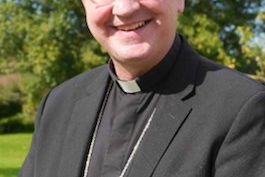Fiducia Supplicans - A storm in a teacup

Source: Jesuit Institute South Africa
For weeks now, there has been fierce, polarising debate in the Catholic Church. At the centre of this is a declaration released by the Vatican on 18 December 2023 entitled 'Fiducia Supplicans' - 'the pastoral meaning of blessings.'
In essence, the declaration gave guidance and permission for Catholic bishops, priests and deacons to bless people who were not married according to the teachings of the Catholic Church. This included those in "irregular unions" - not married in the Church, in polygamous relationships and people of the same sex.
Shortly after its release, many voices shouted, some suggesting it was too little too late, some applauding it, or some calling for its outright rejection. Many African bishops - not all - for example, reacted by saying that it should be rejected, forgotten and ignored in its totality.
On 30 January 2024, the day after the closing of their biannual plenary, the bishops of the Southern African Catholic Bishops' Conference (SACBC) held a press conference. At the meeting, Cardinal Stephen Brislin, Archbishop of Cape Town and spokesperson for the bishops, joined by the President of the Conference, Bishop Sithembele Sipuka of Mthatha, reported on the week-long deliberation of the local bishops. One of the issues they spoke about was the question of the local implementation of "Fiducia Supp "
Cardinal Brislin said the bishops had decided to implement the declaration and its recommendations "prudently". Both bishops noted that the declaration reaffirms the doctrine of the Catholic Church about marriage, which is a lifelong commitment between a man and a woman. They also said this was not a doctrinal shift but a pastoral decision.
Cardinal Brislin explained this very carefully. "It is really a document that is talking about a pastoral practice, for example, for people who are in other irregular situations - like people who are divorced and remarried and haven't managed to have an annulment and young people perhaps who are living together without any marriage or commitment - are not excluded from the pastoral care of the Church."
He went on to explain that the fact that people come for a blessing means that they are open to God's grace; they seek God's grace, which should be remembered. The Cardinal said a blessing is "not a reward for perfection."
Pope Francis has been repeatedly asked about the declaration. He has repeatedly said that the document's heart is about welcoming anyone who comes to the Church, no matter who they are. The Church is not an exclusive club - it is for all people who seek God despite their challenges and weaknesses.
In an interview this week, the Pope said. . to an Italian publication: "The most serious sins are those that are disguised with a more 'angelic' appearance. No one is scandalised if I give a blessing to an entrepreneur who perhaps exploits people, which is a very serious sin. Whereas they are scandalised if I give it to a homosexual -- this is hypocrisy".
The official 'Book of Blessings' has formulas for the blessings of boats, cars, factories, fields, etc. Why exclude categories of people if we have official blessings for all sorts of objects?
One cannot help wondering if much of the energy given to this document is a storm in a teacup, misplaced and wasted - especially as one considers the desperately depressing and more essential things happening in the Church and world.
But, we should face a much more crucial and revealing question: Do we really believe that every human being is 'imago dei' - made in the image and likeness of God? If so, any living person - a 'God-bearer" - should be given, without question, the blessing of their maker.
LINKS
Follow The Jesuit Institute on Twitter @JesuitInstitute
Jesuit Institute South Africa: www.jesuitinstitute.org.za/
SACBC: https://sacbc.org.za/
SACBC Press Conference: www.youtube.com/watch?v=VPA5O5nGh8s


















